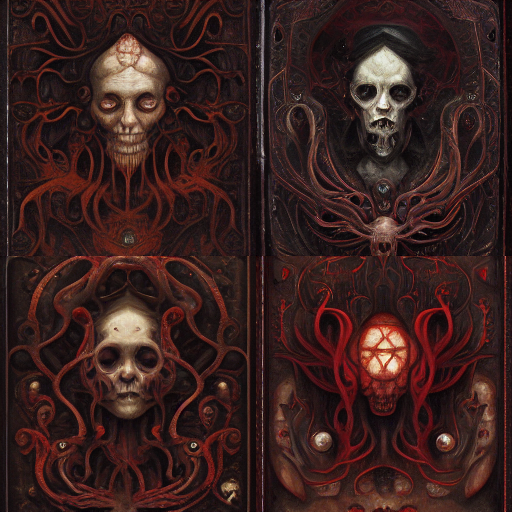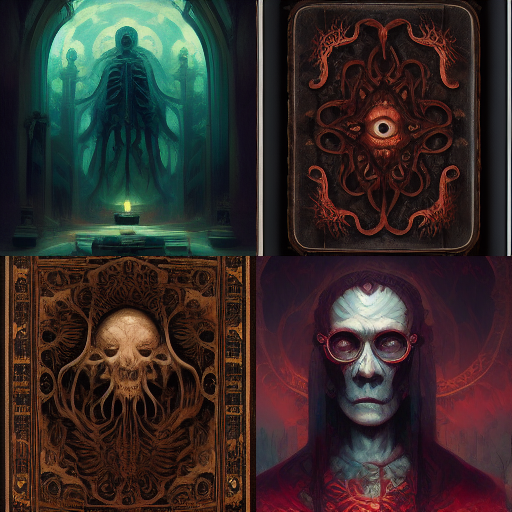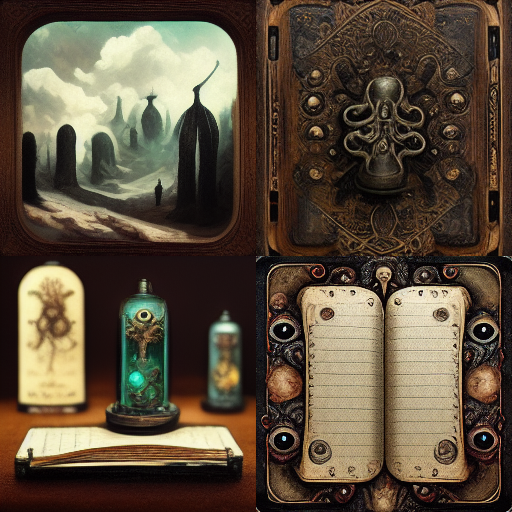AI is going to be our biggest game changer
This discussion has been closed.
Adding to Cart…

Licensing Agreement | Terms of Service | Privacy Policy | EULA
© 2025 Daz Productions Inc. All Rights Reserved.You currently have no notifications.

Licensing Agreement | Terms of Service | Privacy Policy | EULA
© 2025 Daz Productions Inc. All Rights Reserved.
Comments
I see a future for AI as a game changer more in the way joint bendings and muscle movements are processes.
The AI could learn how human and animal tissues but also clothes, fur and hair are moving with a scelleton and give finally more realistic results availeble to a consumer market.
Just imagine DAZ figures move naturally with AI supported clothes and Hair simulations without the risks of exploding cloths because of intersecting meshes.
It's why I think flying cars would actually be bad. It wouldn't be today but people rich enough can drive flying cars but they would redesign entire cities assuming people will have one and you know they won't be cheap
Just check Flying Cars on Wikipedia and you'll notice that a version for day2day life is about as far away from us as real AI. And there are a pure fringe product/idea like Amazon using drones to deliver their wares...
Besides, if everybody has flying cars, the real luxury would be to be able to walk towards your destination.
Around here even traditional luddites like the Mennonites can be seen judiciously shopping occasionally in Walmart to make their lives easier and more enjoyable.
Bonus points would have been if there was a visual avatar. Which some of us may or may not wish to have in our collections... lol
I'd like to see these kinds of developments as well. However, absolutely no artificial intelligence is required for these. These problems could be more easily addressed with better programming by human developers working with "unintelligent" systems.
More sophisticated programming does not equal 'artificial intelligence'. As a term, AI is getting thrown around to mystify both consumers and investors by implying that some sort of technological equivalent of magic is just around the corner.
Imagine that at some point early in the twentieth century, someone invented a steam-powered machine where a person could walk up, stick a coin in the slot, pick from a series of named items from a list (large but finite), and the machine would glue small pictures of the items selected onto a piece of cardboard, making a kind of collage which it dispenses. The machine is entirely mechanical, no digital components, just mechanical switches, pulleys, belts, etc. The resulting collage might be bad or good, but the machine isn't intelligent. If we replace the mechanical components with digital/electronic components, and replace our cardboard-and-glue collage with a digital image (in whatever format) as the output, how would that digital machine be more intelligent?
Exactly! I can't wait for the very things that you cited.
And I will never understand why some people feel that AI is going to destroy art and creativity when a program like DAZ Studio had no other effect than to increase the number of creative minds that can now produce art like those endowed with the talent to do so. I am 100% sure that id it were not for DAZ Studio, specifically, I would not have the means to be engaged in 3D.
I think you are overlooking the combination of those people who have some creativity in their genes as well as access to AI. That's the trend throughout time immemorial. Technology frees the individual from certain tasks and frees him to apply his creativity to the purely creative tasks. I don't believe any of us could deny that, and then fire up Daz Studio. What AI is going to do is a difference in degree only.
You can go back even further... Just check for Heron of Alexandria's inventions to, lo and behold, see automatically opening temple doors, a vending machine giving the customer a portion of holy water after inserting a coin in a slot and some more... for the Greeks/Egyptians of that time, these things must have looked like magic (or artificial intelligence, as in "how do the doors know to open exactly now???").
In 1962, in his book “Profiles of the Future: An Inquiry into the Limits of the Possible”, science fiction writer Arthur C. Clarke formulated his famous Three Laws, of which the third law is the best-known and most widely cited: “Any sufficiently advanced technology is indistinguishable from magic” which explains a lot about the impression that current (not even real) AI makes on us. For the real discussion about AI can start, as soon some AI has managed to get through all the different "AI tests" (Turing, Lovelace etc.) with a 100% result. Might take a while, I think?!?
Backpedalling already? Wasn't it You who was stating that AI will be able to do creative Art itself?
In this new argument I again only see some advanced algorithm being used as a tool for the human's creative process.
Not at all, as that is not a contradiction; I think you may arguing by Appealing to Extremes. It will be no different from the way artists are influenced by prior art. The Lord of the Rings has influenced just about every single fantasy work that came after it, yet none of them are Lord of the Rings, and all of them have their creators' earmarks. Even if LOTR had been written by AI, art-directed by me, I would still have had different ideas, used it for inspiration, and ultimately arrived at something else.
There is no distinction between AI doing the rote and the creative; both free me to promote my creativity. For example, if a character has to be in a certain situation at the beginning of the story because that's how my creativity has deemed it, it would sure be nice if there were an AI that could invent a consistent back story the details of which are not important to me, but must be consistent with what is important to me. That is really no different from setting two key frames and having Blender interpolate between them: I have other things I would rather be thinking about.
Me too, without backpedalling: Because of the nature of creativity, that will never not be the case. But granted, I think Human creativity is about to go off in some never before seen avenues because of this.
You should go for a job in the Hollywood movie industry. I think your way of thinking would fit in there just fine.
they make good prop textures
Holey maccaroni... that thing looks as if it should be positioned behind some weird, dark altar...
Wow. Did you make that, Wendy? If not, do you know what the prompting text was? Like "Make me have a nightmare"?
I can only assume that it included "Giger".
necronomicon
one word but I did a few rolls and upscales to get that from these




I cannot even tell which one I upscaled as the details change
anyway main cover Materialise PBR maps in Freebie section and some inner pages to use in a book, UV fitting up to user
tile and offset in DAZ should work for most books
https://www.daz3d.com/forums/discussion/comment/7616161/#Comment_7616161
Have you seen DALL·E 2 yet?
https://openai.com/dall-e-2/
"DALL·E 2 is a new AI system that can create realistic images and art from a description in natural language."

it at least took a lot of "inspiration" of Giger's "Necronomicon" pictures that can be found on the internet
So as this "AI" quite clearly uses internet sources for it's "art", can we be sure that the results are always free of any copyrights that other people might hold? Or should I imagine lawyers all over their hands excitently while thinking about all the money they might make from this?!?
Woah that's really cool!
I do Wombo and most of the results are disappointing but sometimes it thinks of something good
The reference I gave
I wanted some space opera inspired elements with a Steampunk aesthetic but it's still nice
The next is more like a mannequin than a robot but I like the dress
I think of AI here as a system learning how human skin is moving over skelleton muscle tissue.
Just like Deep Fake is learning, what an individual human face looks like.
I was thinking about a base biped tool, similar to what 3ds max used to have, but it should bring all the AI tools, in order to deform the character's mesh in a natural way including physiks.
You should be able then to add its parameters, like sex, weight, bone-muscle-fat percentages and some joint gizmos in order to fit it inside your character.
Probably my biggest problem with all this discussion is, that most of described here doesn't really fit the name "AI", because it's just a "trained/learning algorithm", that still only does what it's told and what it's code allows it to do. So, quite artificial, but lacking in intelligence and most of all lacking consciousness/awareness. Y'know, the good old "I think, therefore I am"
Thanks, Wendy and Gordig, my familiarity with H.R. Giger did not go past the organic-looking stuff a la the Alien movie. I thought that that was all there was. His other styles are quite interesting to look at as well, and some of them look like the were generated by AI as well; maybe the AI is better at copying his style than it gets credit for :)
My thoughts exactly...
A couple of weeks ago, my (young) boss sent me a link to a program meant for scheduling the different tasks in manufacturing process and he was thrilled to see what the advertised "AI" could do... First I went and banged my head to a concrete wall for a while, before answering... There is no AI there...
Are you kidding? Besides things like random character generation with unique morphs and textures, the possibilities for AI guided weight mapping and collisions are incredible. At Comic Con Brian Habberlin (co creator of Anomoly and WItchblade, and who prompted the development of Poser's toon outline mode in conjunction with Smith-MIcro) demonstrated a hybrid of Pokemon and Garbage Pail kids that was knocked out in minutes yet looked every bit as solid as something a concept artist or 3D sculptor would have taken hours or days creating.
Yes, of course it's and algorithm and there deterministic as all computers must be, but the relationship between the input and the output is so complex that it cannot be recovered, i.e. neural nets are opaque and, given the output, it is not feasible to determine the neural net's reasoning. This is precisely what caused Neural Nets to fall out of favor in the '60s in what is referred to as the Aritificial Intelligence Winter, in favor of expert systems and other rule based systems: these are the algorithmic systems with the qualities you a mistakenly attributing to neural nets. If this opacity was true at that time with neural nets that you could draw out on a napkin, imagine how inscrutable a Deep Learning Neural Net would be that has millions of features. That is the part you are missing. Is an algorithm that you did not explicitly create, and have no possibility of recovering or understanding, really an algorithm at all? If it is, then probably everything is an algorithm and your critique loses its power because it is now a universal truth that doesn't distinguish any one thing from any other.
Neural Nets are different. Applying what you may know about von Neumann computers to them is simply not valid, and I think it is blinding people against how profoundly they're going to change things; people think that they are just a better or faster algorithm just like the kind we've had since the 1940s.
Given that scientists from biologists to phycisists to philosophers can't tell you where conciousness comes from, I'd ease up on the assertions that it is not conscious. I'm not sure why neurons made out of goop ( a better, technical term, Richard? :) ) would gain the title of conscious, but a system that models them would not at least gain the title of "virtual consciousness". If you can't even model what a quality is in detail suitable for scientific inquiry, it should be impossible for lay people like us to assert if arbitrary objects (themselves already beyond our ability to reason about) possess that thing (that is also already beyond our ability to reason about) or not.